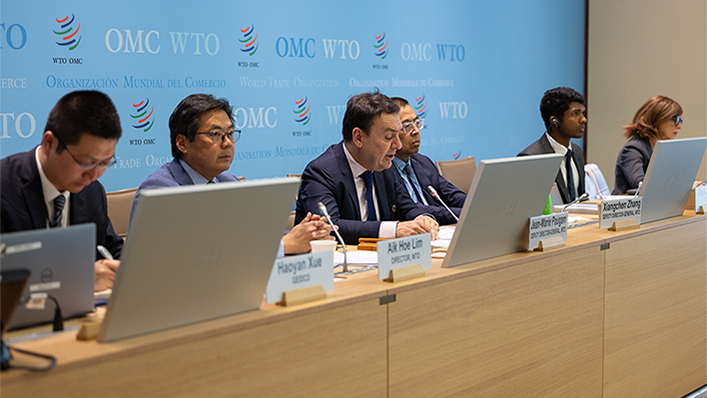
DDG Paugam said: “The clean energy transition is a crucial objective in our path to sustainable development. Trade policy tools — such as rebalancing tariffs in line with climate ambitions or aligning standards to accelerate decarbonisation efforts — can fast-track transition efforts and expedite inclusion of developing economies into green value chains.”
DDG Zhang said: “Global efforts to achieve net zero require concerted efforts of the international community, and developing members have been acknowledging the role of Aid for Trade to help them realize opportunities resulting from green transition.”
The event, titled Supporting the transition to clean energy, provided a preview of a forthcoming WTO publication on how Aid for Trade can help unlock opportunities in the clean energy sector for developing and LDC members. It will be launched at the upcoming Global Review of Aid for Trade 2024.
Vishvanathan Subramaniam of the WTO’s Aid for Trade Unit highlighted trade opportunities that emerge during a clean energy transition. He pointed to examples of how Aid for Trade can help developing and LDC members leverage these opportunities. Aik Hoe Lim, Director of the WTO Trade and Environment Division, noted that as the clean energy transition is a key solution to climate change, it also addresses some of the root causes of land degradation, the theme spotlighted by the United Nations for this year’s World Environment Day. Ruosi Zhang of the WTO’s Trade in Services and Investment Division moderated the event.
Speakers from other organizations highlighted opportunities and recommendations to further integrate developing economies into the clean energy supply chain. Dr Ajay Mathur, International Solar Alliance Director General, noted that while the solar energy sector has attracted around USD 500 billion of investment last year, Africa has received just under 3% of this amount. Financing guarantees, he said, are critical to draw investment in lesser served regions.
Dr Roberta Boscolo of the World Meteorological Organization presented a report on how renewable energy potential can fluctuate across the world due to changing weather patterns. She concluded that market adaptations to encourage investments in energy storage and grids are needed to account for the variability in energy supply.
Cyn-Young Park of the Asian Development Bank outlined vulnerabilities in the global supply chain for critical minerals. She cited recommendations for “greening” and enhancing investment in the sector. Haoyan Xue of the Global Energy Interconnection Development and Cooperation Organization focused on developing energy interconnection in Africa.
Share
Reach us to explore global export and import deals